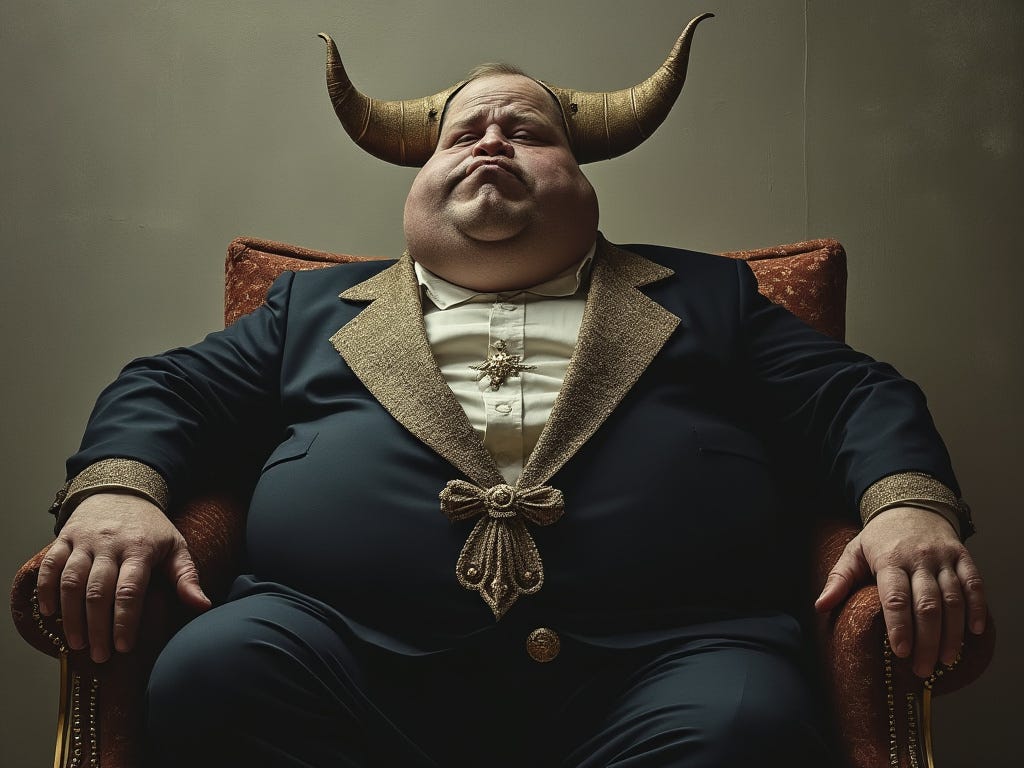A Psalm for Modern Times
by François Mauld d’Aymée
François Mauld d’Aymée critiques the modern bourgeoisie in this scathing essay, portraying it as a decadent and detached class whose materialism, cultural superficiality, and moral complacency symbolize the spiritual decline of modern society.
Moscow — September 20, 2024
Miserable, decadent bourgeois! None of you have shed blood, sweat, or sown seeds in the soil you claim to love more than anyone else. None of you have lost your hearing in factories or on the battlefield. None of you are the subjects of pastorals, grand human frescoes, or collective epics. And yet, you consume them greedily, with the detached contempt or admiration that such behavior implies. Eternal spectators of the world… Some of you become fellow travelers, occasional patrons, or even trade your daughters for glimpses of our glory, but never have we shared, nor will we share, a common adventure. A vast spiritual chasm separates us, one that cannot be bridged.
The bourgeois, seated in his parlor, adores watching the common people die for the homeland. He eagerly attends ceremonies filled with pomp, a severe expression on his face, proud to be near brightly colored uniforms in the halls of mythologized buildings. But should you ask him, “And you — are you going? Or your son?”, the bourgeois bristles, nearly cursing you with his grandiose proclamations of patriotism and love for the country to which he so loudly claims to belong. He who lives only from salon to exhibition, from train to plane, from one capital city to another, obsessed with the minutiae that supposedly distinguish the bourgeoisie of Country A from that of Country B: the hour at which lunch is served, the preference for tea or coffee, the average size of cups, the number of adjective declensions still in use. These are the deepest musings of his life.
The English love to say, without irony, that they are snobs. The bourgeois is indignant when the streets boil with unrest. What is there to complain about? Business is always good! Money is there for those willing to find it. Just rent out a few apartments, no? How, after 2,000 years of history, are the poor still poor? It’s truly absurd.
The bourgeois loves wars, following them in newspapers and on television. Propaganda is crafted by and for him. He delights in military expeditions — especially distant ones — because they serve as theaters of operations (the bourgeois loves anything resembling theater; he’s in the audience, here to watch the play). Such expeditions also open new markets for him and his peers. The bourgeois, in essence, thrives on actors and exchanges. Entertainment serves as his reprieve from the exhausting game of transactions and profits, which he considers work.
The bourgeois typically has few children. He is fascinated by all kinds of murderers. His condition is both the most comfortable and the most detestable. Bourgeois from different regions revel in despising one another — always from a safe distance, of course. That’s what lawyers are for. The bourgeois loves threatening lawsuits, fighting his battles in court. In the last resort, he fights via the poor. He sees poetry and romance only through a pecuniary lens.
Who could aspire to be like him? And yet, this is the choice of the majority — not their dream, but what they find immediately within reach. Wealth dulls the mind. The nationalist bourgeois accommodates all regimes, except for communism, which does not indulge him.
The bourgeois undoubtedly has qualities; he is not devoid of refinement. In his stingy way, he supports the poor and the arts. He buys art by haggling, pays minimum wages, and earns exorbitantly for his minimal efforts. It is thanks to him that the 19th century flourished — a century that was his triumph and remains his nostalgia. Our cultural and literary hagiography is entirely nourished by this century and devoted to it. Songs and later cinema merely copied its ideals, which are bourgeois in nature.
Traveling from city to city, the bourgeois never sees the starry sky. His insomnia is filled with the contemplation of streetlights — reflections of clay, asphalt, and synthetic materials. Wherever he looks, he finds no depth. Stone confines his aspirations. In his universe, everything has a price. Thus, the social order he envisions is governed by mathematical calculations, which, admittedly, demonstrate a certain genius.
Attempts have been made to change him — first through force in the early 20th century, then through technology. Today, he is being presented with the prospect of racial erasure. No longer is the bourgeois expected to be exclusively white. This change is driven by the bourgeois climbing higher and faster than his peers. His ultimate intentions remain baroque, vulgar, immediate. A shadow of doubt looms over his future.
He does not die like others. He succumbs to indigestion, to an excess of comfort. He dies with a bloated belly. The world is about to perish with an enormous gut. And to our great misfortune, we move forward in this century, side by side with this failing obese entity. We accompany him, unwillingly, not knowing whether pity or contempt should prevail for this being, irrevocably finished, whose soul is poised to fall into the endless abyss of oblivion.
(Translated from the French)



